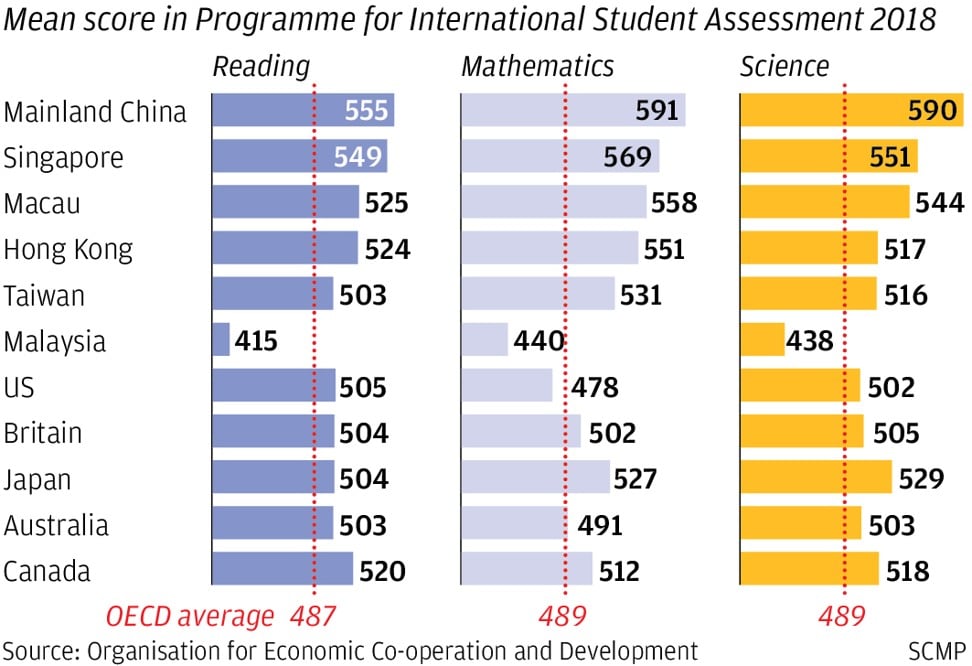- Joined
- Sep 22, 2008
- Messages
- 86,475
- Points
- 113
But nobody wants to hire them. They will steal your IP, become spies, sexually abuse female colleagues....
Lifestyle & Culture
Mainland Chinese students best in world as Singapore, Hong Kong slip down rankings

Dewey Sim
Published: 4:00pm, 3 Dec, 2019
12

Students attend class at a school in Hefei, capital of east China's Anhui province. Photo: Xinhua
Students from mainland
China
have edged out those from
Singapore
to take the top spot in a global benchmarking test, according to results announced on Tuesday.
The latest edition of the Programme for International Student Assessment (Pisa) survey, conducted last year, assessed the performance of 15-year-olds from 79 education systems around the world in science, mathematics and reading.
Is corporal punishment acceptable in Chinese schools?
Students from the four participating cities in mainland China – Beijing, Shanghai, Jiangsu and Zhejiang – came first in all three categories, with 590 points in science, 591 points in mathematics, and 555 points in reading.
Advertisement
Those from the Lion City, meanwhile, scored 551, 569 and 549, respectively, taking second place.
In the last survey, conducted in 2015, they came first
.

A graphic showing the 2018 Pisa score of 11 different education systems
The mean scores for all students that took part in the triennial assessment by the Organisation for Economic Cooperation and Development (OECD) were 489 points in science, 489 in maths and 487 in reading. Between 4,000 and 8,000 students from each education system were assessed.
In this year’s edition,
Hong Kong
– where 6,037 students from 152 schools were randomly selected for the assessment – was also nudged down in the charts, ranking fourth in mathematics and reading, and ninth in science.
American
students, meanwhile, placed 13th in reading, 37th in mathematics, and 18th
Angel Gurria, secretary general of the OECD, wrote in the opening remarks of the report that mainland Chinese students have “outperformed by a large margin” their peers from other countries, particularly in mathematics and science.
He noted, however, that the four cities whose students were assessed did not represent “China as a whole”, but that their sizes and make-up were comparable to a typical OECD country.
Lifestyle & Culture
Mainland Chinese students best in world as Singapore, Hong Kong slip down rankings
- The results of the latest Programme for International Student Assessment (Pisa) survey were announced on Tuesday
- It found 15-year-olds from Beijing, Shanghai, Jiangsu and Zhejiang outperformed those from 78 other education systems

Dewey Sim
Published: 4:00pm, 3 Dec, 2019
12

Students attend class at a school in Hefei, capital of east China's Anhui province. Photo: Xinhua
Students from mainland
China
have edged out those from
Singapore
to take the top spot in a global benchmarking test, according to results announced on Tuesday.
The latest edition of the Programme for International Student Assessment (Pisa) survey, conducted last year, assessed the performance of 15-year-olds from 79 education systems around the world in science, mathematics and reading.
Is corporal punishment acceptable in Chinese schools?
Students from the four participating cities in mainland China – Beijing, Shanghai, Jiangsu and Zhejiang – came first in all three categories, with 590 points in science, 591 points in mathematics, and 555 points in reading.
Advertisement
Those from the Lion City, meanwhile, scored 551, 569 and 549, respectively, taking second place.
In the last survey, conducted in 2015, they came first
.

A graphic showing the 2018 Pisa score of 11 different education systems
The mean scores for all students that took part in the triennial assessment by the Organisation for Economic Cooperation and Development (OECD) were 489 points in science, 489 in maths and 487 in reading. Between 4,000 and 8,000 students from each education system were assessed.
In this year’s edition,
Hong Kong
– where 6,037 students from 152 schools were randomly selected for the assessment – was also nudged down in the charts, ranking fourth in mathematics and reading, and ninth in science.
American
students, meanwhile, placed 13th in reading, 37th in mathematics, and 18th
Angel Gurria, secretary general of the OECD, wrote in the opening remarks of the report that mainland Chinese students have “outperformed by a large margin” their peers from other countries, particularly in mathematics and science.
He noted, however, that the four cities whose students were assessed did not represent “China as a whole”, but that their sizes and make-up were comparable to a typical OECD country.







